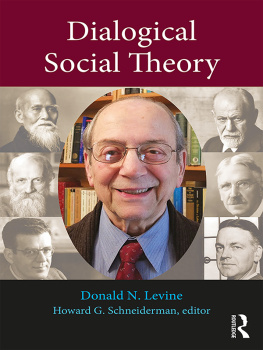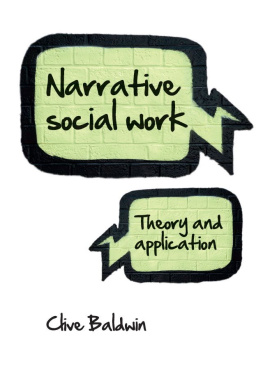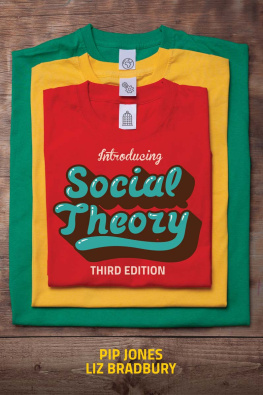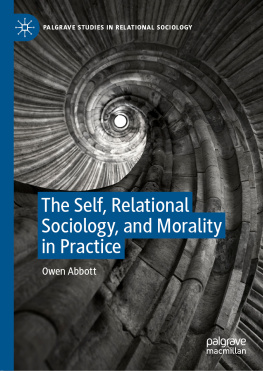ROUTLEDGE LIBRARY EDITIONS:
SOCIAL THEORY
Volume 30
IDEAS AND INTERVENTION
IDEAS AND INTERVENTION
Social theory for practice
JOE BAILEY
First published in 1980
This edition first published in 2015
by Routledge
2 Park Square, Milton Park, Abingdon, Oxon, OX14 4RN
and by Routledge
711 Third Avenue, New York, NY 10017
Routledge is an imprint of the Taylor & Francis Group, an informa business
1980 Joseph Bailey
All rights reserved. No part of this book may be reprinted or reproduced or utilised in any form or by any electronic, mechanical, or other means, now known or hereafter invented, including photocopying and recording, or in any information storage or retrieval system, without permission in writing from the publishers.
Trademark notice: Product or corporate names may be trademarks or registered trademarks, and are used only for identification and explanation without intent to infringe.
British Library Cataloguing in Publication Data
A catalogue record for this book is available from the British Library
ISBN: 978-0-415-72731-0 (Set)
eISBN: 978-1-315-76997-4 (Set)
ISBN: 978-1-138-79060-5 (Volume 30)
eISBN: 978-1-315-76360-6 (Volume 30)
Publishers Note
The publisher has gone to great lengths to ensure the quality of this reprint but points out that some imperfections in the original copies may be apparent.
Disclaimer
The publisher has made every effort to trace copyright holders and would welcome correspondence from those they have been unable to trace.
Ideas and intervention
Social theory for practice
Joe Bailey
First published in 1980
by Routledge & Kegan Paul Ltd
39 Store Street, London WC1E 7DD,
Broadway House, Newtown Road,
Henley-on-Thames, Oxon RG9 1 EN and
9 Park Street, Boston, Mass. 02108, USA
Set in Times by Computacomp (UK) Ltd
Fort William, Scotland
and printed in Great Britain by
Lowe & Brydone Ltd Thetford, Norfolk
Joseph Bailey 1980
No part of this book may be reproduced in
any form without permission from the
publisher, except for the quotation of brief
passages in criticism
British Library Cataloguing in Publication Data
Bailey, Joe
Ideas and intervention.
1. Sociology
1. Title
30 1.01 HM24 79-42875
ISBN 0 7100 0367 6
ISBN 0 7100 0459 1 Pbk
Sociology, more than most disciplines, is unstable. A concern with theory has ebbed and flowed a number of times in its history and we appear to be about to enter another period of impatience with theorizing as a reaction to the last decades avid abstractionism. This book is an attempt to describe the relevance of theorizing against such a mobile and fraught background. In particular the recent tendency of theorizing to self-generation and of theorists to be seduced away from the objects of theory (other peoples concerns or a primitive perception of social problems) forms the immediate academic context.
This book is a response to some of the problems I have encountered in teaching sociological theory to students in sociology departments and in a variety of vocational areas. There is a closure in theory which is potentially hermetic. This is often dealt with by the theorist by, in effect, abandoning sociology as a discipline concerned with problems suffered by people and implicitly advocating theory itself as a way of avoiding these problems by redefining them into purely abstract terms. This is not enough. There are no purely philosophical solutions, and students generally sense this and often reject theory (and sometimes sociology with it) as a result.
But theory is relevant because it is unavoidable.
I would like to thank the Organization of Sociologists in Polytechnics for permission to include in part of a previously published paper.
This book is for Caro, Anna and Josh.
Sociology is not enjoyed, used or approved yet sociology is taught as a formal discipline to increasing numbers of people. This is a paradox. Sociology has until recently in its, so far brief, institutional life existed in an atmosphere of internal disagreement and external uncertainty. Sociology now suffers internal schism and external hostility. This is a crisis. The paradox and the crisis make the present time for sociology something of a climacteric. Put plainly, I fear that the potential good in sociology will be destroyed as its institutional existence becomes increasingly questioned. This questioning is only partly justified, but it is responding to the dogmatism, feebleness, amorality and arrogance that flowers in so much of sociology now. The recent proliferation of sociological sects is healthy and interesting but the abandonment in the process of all common, broad goals with respect to activism, teaching, scholarship and research is the beginning of a holy war of attrition.
It was not always so. The history of British sociology suggests that while there have been problems surrounding its institutionalization, especially up to the First World War, the internecine strife which existed in the nascent discipline was always within a very broad framework of agreed intentions. The general tradition within which such apparently opposed approaches as administrative data-gathering, ameliorism and social evolutionism competed for supremacy was one of interventionism.dispute resulted in the peaceful co-existence of different sociologies. Such pluralism and tolerance could be said to be in great part one of the reasons for the existence of sociology as a discipline. This is not to praise the quality of the newly born subject, or to deny that a different mix of approaches (civics, eugenics, Boothism, etc.) would not have improved the quality of present-day sociology. It is simply to say that if the establishment of sociology had waited upon a contest to be won, certain styles and theoretical traditions to be vanquished and somehow extinguished, we would be waiting yet. If such a pluralism was important in the conception, why has it become so redundant in the subsequent nurturing? Why can progress now be talked about only in terms of the destruction of obstacles (for instance the getting rid of residual functionalism) and the ascendency of one particular approach (for instance historical materialism)?
This all sounds like complaining for its own sake. One of the aims of this book is to evaluate a purely critical sociology and to suggest that sociology can and should be constructive. Following my own advice, I ask what do I want sociology to be?
Most importantly I want sociology to be a servant and not a master, a means and not an end. But to what end? Barrington Moore has tried to discuss the universal, institutional conditions of human misery and unhappiness in a way that social scientists, parochial as they are, have completely neglected. By extension one can ascribe to sociology the task of reducing misery. This is one bald and unexceptionable programme for justifying all organized intellectual activity. At this stage one need not be more explicit than this. Even by such an apparently idealistic and general prospectus a great deal of contemporary sociology, even where it claims to demystify, appears self-indulgent and inward-looking. In order to reduce misery, promote happiness and in some way deal with the problems of men and women sociology must have an institutional existence. Great intellectuals have often avoided universities like the plague (for instance Condorcet, Goethe, Marx), yet their own thought was nurtured by, created in opposition to, or founded upon, bodies of knowledge intimately connected with university-based scholarship.








